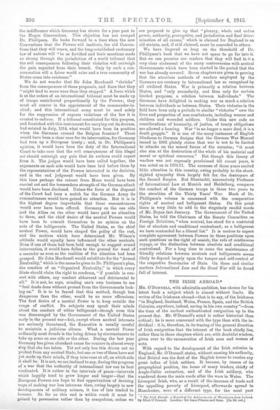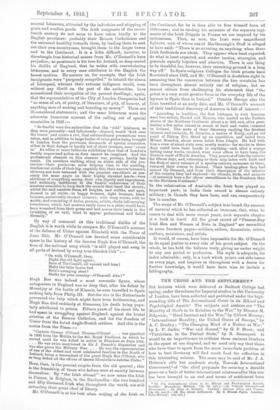THE IRISH ABROAD.* Mn, O'DomiELL, with admirable ambition, has chosen
for his latest book a subject which is almost without limits. He writes of the Irishman abroad—that is to say, of the Irishman "in England, Scotland, Wales, France, Spain, and the British Colonies, anywhere, indeed, saving in his own country "—from the time of the earliest authenticated emigration up to the present day. Mr. O'Donnell's mind is rather historical than critical; he is more concerned with the type than with the dividual : it is, therefore, in its tracing of the general direction of Irish emigration that the interest of the book chiefly lies, rather than in those chapters which are, with doubtful wisdom, given over to the enumeration of Irish men and women of note.
With regard to the development of the Irish colonies in England, Mr. O'Donnell states, without naming his authority, that Bristol was the first of the English towns to receive any great influx of Irish settlers. It became, by reason of its geographical position, the home of many traders, chiefly of Anglo-Celtic extraction, and of the Irish soldiery, who wandered down the main roads after the wars in Wales. The Liverpool Irish, who, as a result of the increase of trade and the appalling poverty of Liverpool, afterwards spread to Manchester, were of a different type, for the most part
" The Irish Abroad : a Record of the Aohievenvnts of Wanderers from Ireland. Ily Eliot O'Donnell. London ; Sir Isaao Pitman and Sono. [70. Od. net.] manual labourers, attracted by the industries and shipping of grain and woollen goods. The Irish emigrants of the seven-
teenth century do not seem to have taken kindly to the English provinces: probably their Roman Catholicism end the universal hostility towards them, by leading them to seek out their own countrymen, brought them to the larger towns and to the Continent. It. is a. little difficult, however, to disentangle true historical causes from Mr. O'Donnell's keen prejudice; so passionate is his love for Ireland, so deep-seated his dislike of England, that he writes with overwhelming bitterness, and in every ease attributes to the English the basest motives. He assures us, for example, that the Irish immigrants were "purposely compelled" to inhabit the slums of Liverpool, whereas their extreme indigence would, even without any iliwill on the part of the authorities, have necessitated their occupation of the poorest dwellings; again, that the representatives of the City of London Companies had "no sense of art, of poetry, of literature, of pity, of honour, of anything save of making and hoarding up money." These are ill-considered statements; and the same bitterness mars the otherwise humorous account of the calling out of special constables in 1848
" So fearful were the authorities that the ' wild' Irishmen, as they were generally—and fallaciously—deemed, would 'kick over the traces' and create a riot, that extraordinary precautions were taken, and in addition to large bodies of extra police being brought to London from tho provinces, thousands of special constables, either in their dotage or hardly out of short trousers, were sworn in.' An odder or more ludicrous exhibition than that of London's hastily improvised police on duty cannot be imagined. And the professional element on this occasion was, perhaps, hardly less combo. Its members stalking along on either side of the pro- cession—their ponderous arms keeping time to the ambling, mechanical stride of their big., ungainly feet, their narrow brimmed, chimney-pot hats balanced with the greatest exactitude at pre- cisely the same angle on their highly elevated heads—were oblivious of everything saving their own dignity and importance, and sublimely indifferent to the frantic endeavours of their amateur comrades to keep back the crowds that lined the streets ; whilst the said amateur force, all heights, and widths, and ages, dressed in all styles—in baggy trousers, tight trousers, black trousers, audaciously checked trousers; with wasp waists, with no waists ; and consisting of dudes, parsons, artists, clerks (all carrying truncheons, which, had matters really come to a crisis, would have been wrenched front their grasp and laid across their heads in the twinkling of an eye), tried to appear professional and failed dismally.'
By way of comment on this traditional dislike of the English it is worth while to compare Mr. O'Donnell's account of the defence of Ulster against Elizabeth with the Times of June 30th. Mr. O'Donnell has devoted some considerable space to the history of the famous Ilugh Roe O'Donnell, the hero of the national song which " is still played and sung in all parts of Ireland by every true-blooded Celt" :—
" On with O'Donnell, then, Fight the old fight again ; Sons of Tir-Conaill, all valiant and true I Make the false Saxon fool Erin's avenging steel I Strike for your country—O'Donnell Abu "
Hugh Roe was indeed a most romantic figure, whose antagonism to England was so deep that., after his defeat by Mountjoy at the battle of Kinsale, he even travelled to Spain seeking help from Philip III. But the war in the Netherlands prevented the help which might have been forthcoming, and Hugh Roe died suddenly at Simancas, his death being popu- larly attributed to poison. Fifteen years of his short life he
had spent in struggling against England, against the brutal eviction of the Roman Catholics, and for the freedom of
Ulster from the hated Anglo-Scotch settlers. And this is the notice from the Times :- "Captain George O'Donel Thomas-O'Donel . . . was gazetted in 1900 from the Militia to the 4th Royal Fusiliers, in which he served until he was killed in action in Flanders on June 113th. . . . He was twice mentioned in Sir J. French's dispatches and was also given the Military Star. . . . He was the representative of one of the oldest and most celebrated families in the North of Ireland, being a descendant of the great Hugh Roe O'Donel, who so long defied all the efforts of Queen Elizabeth to subdue Ulster."
Here, then, is the present respite from the old quarrel ; this is the friendship of those who before were at enmity between themselves. By "the Irish abroad" we now mean the Irish in France, in Belgium, in the Dardanelles—the two hundred and fifty thousand Irish who, throughout the world, are still defending their great ideal of liberty. Mr. O'Donnell is at his best when writing of the Irish on the Continent, for he is then able to free himself from all bitterness ; and in reading his accounts of the separate regi- ments of the Irish Brigade in France we are inspired by his enthusiasm. Then, as now, the Irish were magnificent fighters, men of whom one of Marlborough's Staff is alleged to have said: "There is no counting on anything when those Irish firebrands are about. They appear when least expected, do what is least expected, and render tactics, strategies, and generals equally hopeless and abortive. There is one thing to be thankful for, however, their recruiting ground is a long way off." In Spain religions Colleges for Irish priests have flourished since 1592, and Mr. O'Donnell is doubtless right in assuming that the connexion between the two countries has been throughout almost entirely cue of religion; but we cannot refrain from challenging his statement that "the priest is a very much greater force in the everyday life of the layman in Spain than in Ireland." Outside Europe also the Irish travelled at an early date, and Mr. O'Donuell'e account of their traditional discovery of America is full of interest :—
" According to tradition, the first Irishmen to visit America were two sailors, Barind and Mernoc, who landed on tho Eastern shores of the Northern Continent about A.D. 500, and, after pene- trating a, few miles inland in search of food and water, returned to Ireland. The news of their discovery exciting the liveliest interest and curiosity, St. Brendan, a native of Kerry, and an old pupil of Bishop Era, fitted up an expedition, and sailed from Mount Brandon, about seven miles from Dingle. He had with him a crow of about sixty men, mostly monks—for monks in those days could turn their hands to anything—and, after a voyage lasting many weeks, reached, what some affirm to have been, the Eastern coast of North America. They penetrated into the interior for fifteen days, and, returning to their ship laden with fruit and the flesh of many animals of a species entirely unknown to them, retraced their course to Ireland. Their landing-place they had named Ily-Breasail, and from their description of the interior of the country they bad explored—its climate, birds, and animals —it certainly bore a far closer resemblance to the Southern than to the Northern Continent."
In the colonization of Australia the Irish have played an important part; in India their record is almost entirely
military; in Canada they have been, and are, comparatively few iu number.
The scope of Mr. O'Donnell's subject is so broad, the amount of material which he has collected so immense, that, when he comes to deal with more recent years, each separate chapter is a book in itself. All the great crowd of "Present-Day Irish Men and Women of Note in England" are assembled in some fourteen pages—soldiers, sailors, dramatists, actors, authors, musicians, and artists.
It would, of course, have been impossible for Mr. O'Donnell to do equal justice to every side of his great subject. On the whole, lie has held the balance truly, giving no undue weight to any one period or profession. His style is adequate, his index admirable; only, in a book which points out side-issues on every page, and inspires us throughout with a desire for further knowledge, it would have been wise to include a bibliography,



































 Previous page
Previous page